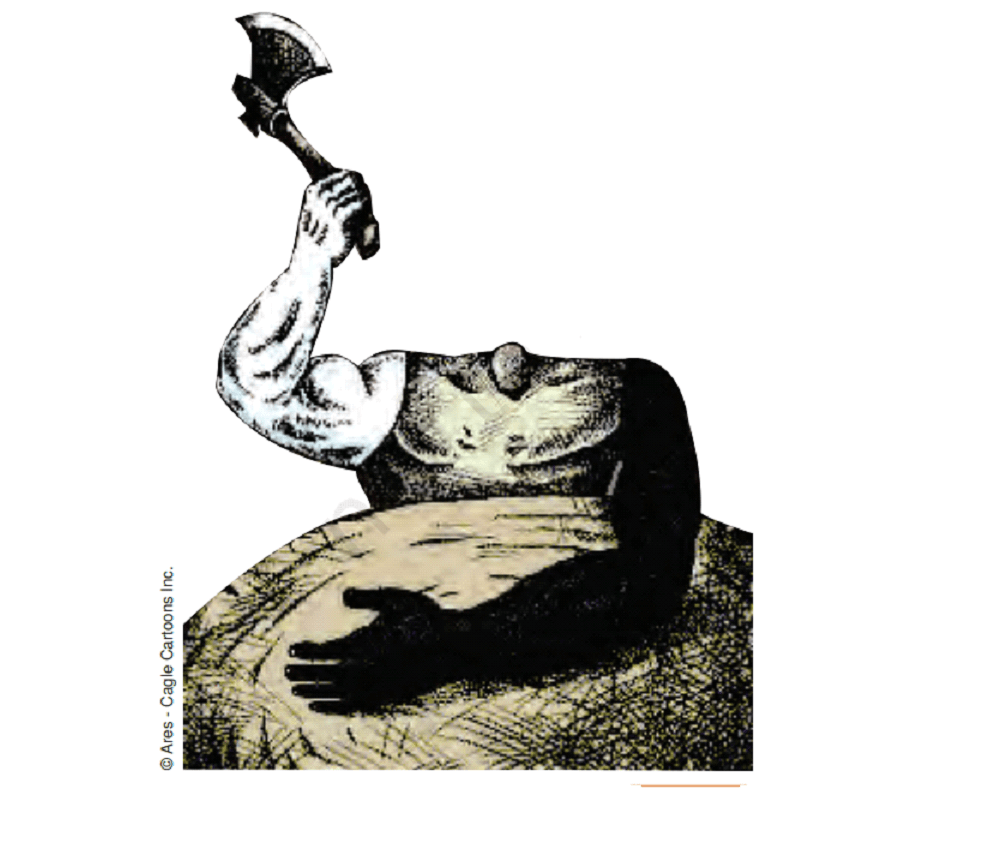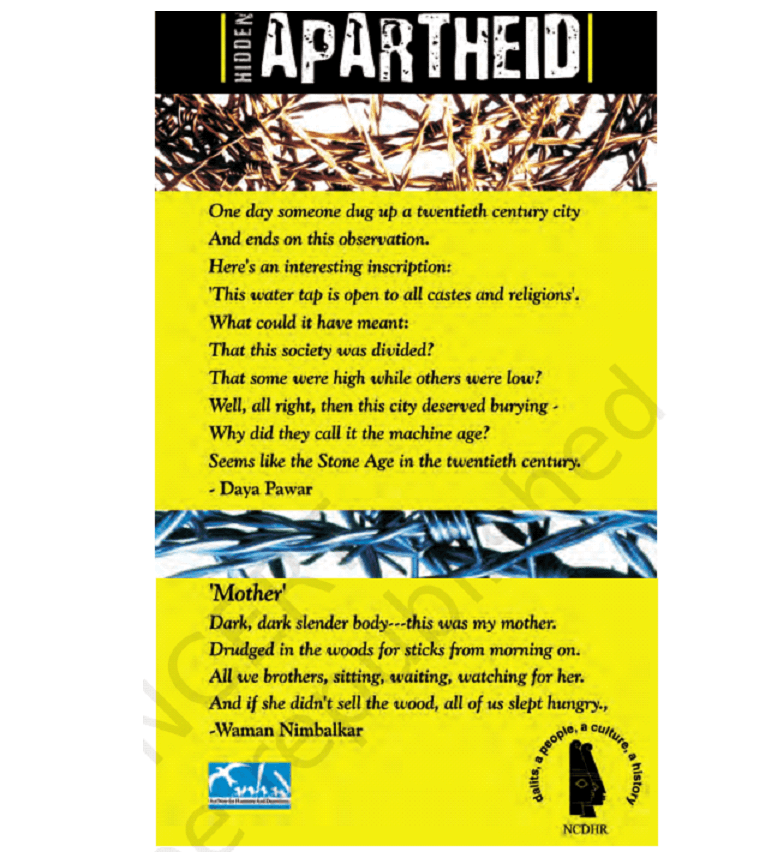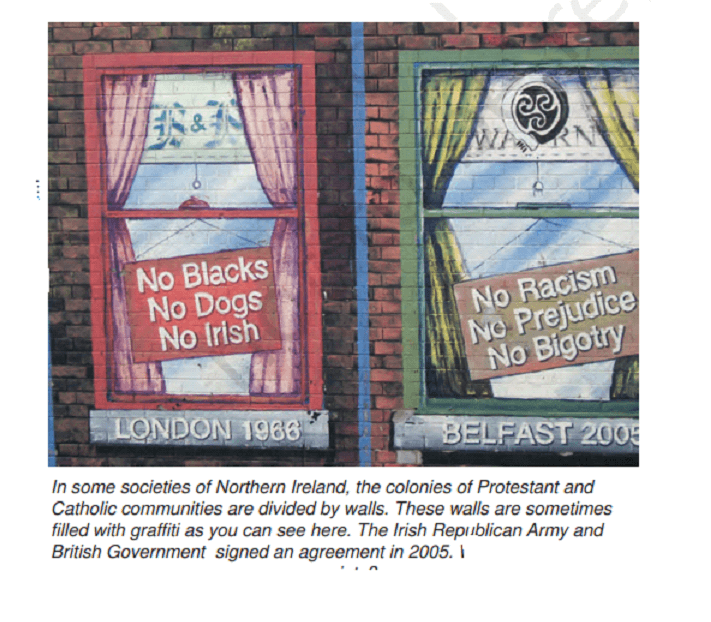Civics - Class 10
Democratic Politics - II
Chapter 3: Democracy and Diversity
Intext Questions:
Question 1: My salute to Carlos and Smith! Will I ever have the courage to do what they did?
Answer:
Yes, you will have the courage to do what they did. Because discrimination in any form is fatal to human survival. So one should fight it to get the respect in the community, one should be brave enough to fight against the discrimination.
Question 2: Some Dalit groups decided to participate in
the UN Conference against racism in Durban in 2001, demanding the inclusion of caste in
the agenda of this conference. Here are three reactions to this move:
Amandeep Kaur (a government official): Our Constitution declares caste discrimination to
be illegal. If some caste discrimination continues, it is an internal matter. I am
opposed to this being raised in an international forum.
Oinam (a sociologist) : I am opposed to this because caste and race are not similar
divisions. Caste is a social division, while race is a biological one. Raising caste in
this conference on racism would mean equating the two.
Ashok (a Dalit activist) : The argument about internal matter is a way of preventing
open discussion of oppression and discrimination. Race is not purely biological. It is
as much a legal and sociological category as caste. Caste discrimination must be raised
in this conference.
Which of the three opinions do you agree with most and why?
Answer:
I agree with the opinion of Ashok to a certain extent. In the name of internal matter, all people should be involved in decision making. People should not be prevented from an open discussion of oppression and discrimination. Providing reservations in education and jobs merely doesn’t solve the problem of internal issues. If there is oppression and discrimination in the society, we cannot call ourselves a democratic nation.
Instead discussion can show us the way to eradicate all these practices and share happiness and sorrow with the deprived classes casually. This is what the true democracy is meant for.
Question 3: I met this group of girls from Pakistan and felt that I had more in common with them than many girls from other parts of my own country. Is this anti- national to feel so?
Answer:
No. This is not anti- national to feel so because the groups that share a common interest on one issue are likely to be in different sides on a different issue. For example the girls from Pakistan may speak Hindi , eat Punjab dishes on the other hand girls from Karnataka may speak Telugu and like to eat south India dishes. So, north Indian muslim girl can find more in common with Pakistani girls and that will not be an anti- national feeling.
Question 4: A cartoon like this can be read by different people to mean different things. What does this cartoon mean to you? How do other students in your class read this?

Answer:
(i) For me, this cartoon
reflects that various social differences have taken a giant form and one of the giant of the
society cuts its other organ i.e., it harms itself.
(ii) Other students in my class differ in their opinions. Some of them take it as the symbol
of the use of money and muscle power in politics. Some others read it as a giant of social
difference that beheads himself, etc.Other students have different opinions and perspectives.
Question 5: Read these two poems by Dalit writers. Why do you think the poster is titled ‘Hidden Apartheid’?

Answer:
The statement, ‘This
water tap is open to all castes and religions’ show that at one or the other stage of time,
the society practiced discrimination based on caste and religion which was later abolished
by someone who made the tap open to all. Earlier when discrimination was practised, people were not allowed to avail all opportunities.
The second poem reveals how people slept without
having a handful of meal. These examples reflect social discrimination being practiced in
the society. So, these have a proper heading i.e., ‘Hidden Apartheid’.
Question 6: Imrana is
a student of class X, section B. She and all her classmates are planning to help
students of class XI in giving a farewell party to the students of class XII. Last
month she played for section team in a game of kho- kho against the team of class X,
section A. She goes back home in a bus and joins all the students from various
classes all of who come from trans-Yamuna area in Delhi. Back home, she often join
her elder sister, Naima, in complaining against her brother who does no work at
home, while the sisters are asked to help their mother. Her father is looking for a
good match for her elder sister, from a Muslim family with a similar economic
status, from their own ‘biradari’.
Can you list the various kinds of identities that Imrana has?
At home she is a girl
In terms of religion she is __________
In the school she is ________
____________ she is __________
____________ she is __________
Answer:
At home she is a girl
In terms of religion she is Muslim
In the school she is a class X student
In class X she is from section B
In the game she is a member of kho-kho team
In the family she is Naima’s younger sister
Question 7: Do you think Mahashweta is right? Do you know of some community in your area who is treated like the Romas?
Answer:
(i) Yes, Mahashweta is right
when she says that it was a story of our own country.
(ii) Nuts, Banjaras and some Dalit castes are treated in such an unjustified way like the
Romas, in our country.
Question 8: Have you heard people say things similar to what Yordanka or Modruzeni say here? If yes, try to think of what the story would sound like if you heard it from other side?
Answer:
Yes many people behave like Yordanka or Modruzeni. We should think ourselves in the position of Dalits while treating them, how we will feel if we are treated like that. We should realize that various social and economic factors are responsible for these pathetic conditions and must give equal chances for marginalised people to improve.
Question 9: Do you think the Bulgarian government should try to ensure that the Roma people dress and behave like other people from Bulgaria?
Answer:
Bulgarian government should not try this. In democracy, every people have the freedom of dress and behaviour of his/her choice if not harms others. No one can compel a particular community to dress other than their own identified dress until and unless it doesn’t harm anyone. Because in democracy, every one’s identity must be protected.
Question 10: What does the graffiti here tell about the conflict in the society?

Answer:
The graffiti tells us in how people used to be discriminated on the basis of colour and origin, the people used to hate Blacks and Irish. In 2005, in Belfast, racism has been prohibited and people treat each other’s equally without any prejudice.
It
does not mean that social differences have been abolished. It means that people started accepting the differences in a peaceful manner.
Question 11: Draw or collect some image of social divisions in different aspects of life.
Answer:

Question 12: Can you think of some examples of social division or discrimination in the field of sports?
Answer:
(i) In cricket, few decades ago,
the Blacks were banned from becoming captain of the South- African team.
(ii) Even today games like Polo, Billiards, Golf, car racing are beyond the reach of the poor people.
Question 13: So, you are saying that too many small divisions are better than a single big division? Are you also saying that politics is a force of unity.
Answer:
(i) Existence of social
divisions reflect the multicultural facet of the society. Divisions, whether big or small,
can be bad or good depends on various factors such as how do they identify themselves, how
their demands raised and what is the reaction of the rulers.
(ii) Not exactly, but yes politics has the force to unite the country. It depends how do the
political leaders from different communities think and how much flexible they are.
Exercise
Question 1: Discuss three factors that determine the outcomes of politics of social divisions.
Answer:
Following are the three factors crucial in deciding the outcome of politics of social division:
- (i) People’s perception of their identities: If people perceive their identities as a part of the nation, then people belonging to the different casts, religions and traditions can live peacefully in a country. If people see their identities in singular terms and demand a special recognition, it becomes very difficult to accommodate.
- (ii) Political parties approach to community: It is easier to accommodate demands that are within the constitutional framework and are not at the cost of another community. Like it happened in Srilanka, it led to deficit of trust among communities and led to civil unrest.
- (iii) Government's role to the demands of different groups: If government give equal chances, then social divisions are minimised if the government gives equal representation to all the major and minor groups in the society and powers are shared among all of them.
Question 2: When does a social difference become a social division?
Answer:
Social difference means when there is difference in people based on language, colour, origin and race. Social division takes place when some social difference overlaps with many other social differences. Situations of the kind when one kind of social difference becomes more important than the other and people start feeling that they belong to different communities, gives rise to the social divisions. In India, marginalised people tend to be poor and landless. They often face discrimination and injustice.
Question 3: How do social divisions affect politics? Give two examples.
Answer:
(i) If social division is of such type that people see their identities in singular and
exclusive terms, it becomes very difficult to accommodate. . In India, many people vote based on religion or caste. It often leads to electoral win of dishonest and corrupt leaders.
(ii) ) If rulers are willing to share power and accommodate the reasonable demand of minority community, social division becomes less threatening. For example, in India because of secular characteristics, there is no division of country on the basis of religion after independence.
Question 4: _________ social differences create possibilities of deep social divisions and tensions. ________ social differences do not usually lead to conflicts.
Answer: Overlapping, Cross- cutting.
Question 5:
In dealing with social divisions which one
of the following statements is NOT correct about democracy?
(a) Due to political competition in a democracy, social divisions get reflected in
politics.
(b) In a democracy it is possible for communities to voice their grievances in a
peaceful manner.
(c) Democracy is the best way to accommodate special diversity.
(d) Democracy always leads to disintegration of society on the bais of social divisions.
Answer:
(d) Democracy always leads to disintegration of society on the basis of social divisions.
Question 6: Consider the following three statements.
A. Social divisions take place when social differences overlap.
B. It is possible that a person can have multiple identities.
C. Social divisions exist in only big countries like India.
Which of the statements is /are correct?
Answer:
B) A and B
Social division can exist in any part of the world no matter how small or big a country is. In the social division, it is possible that a person can have multiple identities.
Question 7: Arrange the following statements in a
logical sequence and select the right answers by using the code given below.
A. But all political expression of social divisions need not be always dangerous.
B. Social divisions of one kind or the other exist in most countries.
C. Parties try to win political support by appealing to social divisions.
D. Some social differences may result in social divisions.

Answer: (a) D, B, C, A
Question 8: Among the following, which country suffered
disintegration due to political fights on the basis of religious and ethnic
identities?
(a) Belgium
(b) India
(c) Yugoslavia
(d) Netherlands
Answer:
(c) Yugoslavia- Political competition along religious ending ethnic lines led to the disintegration of Yugoslavia into six independent countries.
Question 9: Read the following passage from a famous
speech by Martin Luther King Jr. in 1963. Which social division is he talking about?
What are his aspirations and anxieties? Do you see a relationship between this speech
and the incident in Mexico- Olympic mentioned I this chapter?
“I have a dream that my four little children will one
day live in a nation where they will not be judged by the colour of their skin but
by the content of their character. Let freedom ring. And when this happens, and when
we allow freedom ring – when we let it ring from every village and every hamlet,
from every state and every city, we will be able to speed up that day when all of
God’s children – black men and white men, Jews and Gentiles, Protestants and
Catholics – will be able to join hands and sing in the words of the old Negro
spiritual : Free at last! Free at last! Thank God Almightly, we are free at last!’ I
have a dream that one day this nation will rise up and live out the true meaning of
its creed ; We hold these truths to be self- evident : that all men are created
equal."
Answer:
(i) He is talking about social division based on singular identity, i.e., overlapping social
differences.
(ii) He wants a society that practice equality and free of any type of discrimination. He is worrying about identifying people by their skin colour and not judged by the content of their character.
(iii) Yes. His speech reflects the pain of social division based on the colour of skin. As
this was also reflected and protested by the Black Olympians at Mexico Olympics.